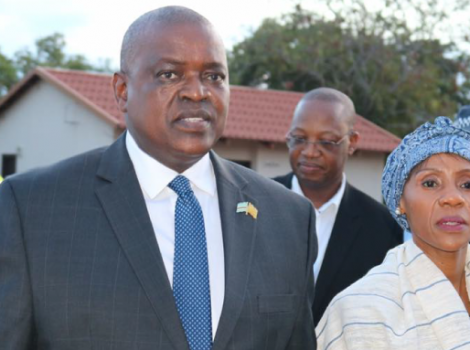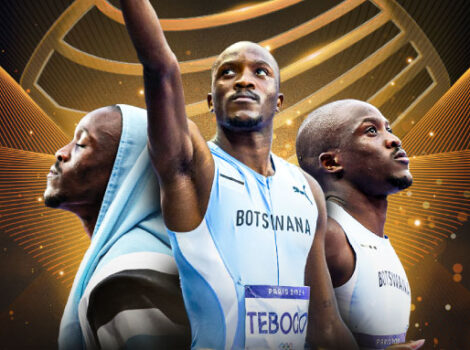
18 January 2024
As Botswana’s great track hope ahead of the 2024 Olympics, Letsile Tebogo has lofty ambitions for Africa.
Yet the 20-year-old, who claimed two medals at the World Championships last year, is keeping a cool head as his own focus this year shifts towards the Paris Games, which begin on 26 July.
“I don’t have any goals for the Olympics because I haven’t thought about what will happen,” Tebogo told Newsday on the BBC World Service.
“I need to sit down and see, and then set the goals. I will then announce my goals if I feel like it.”
Part of the reason for Tebogo’s reticence is the fact he is representing a country that has only won two medals since it first competed in the Olympics in 1980 – with neither of them gold.
Nijel Amos claimed the southern African nation’s first Olympic medal in 2012, winning silver in the men’s 800m.
Nine years later, the quartet of Isaac Makwala, Bayapo Ndori, Zibane Ngozi and Baboloki Thebe won men’s 4x400m relay bronze at the delayed 2020 Games in Tokyo. Now attention has turned to Tebogo, and the expectation on his shoulders is justified.
A two-time 100m champion at world Under-20 level, where he also picked up two silver medals over 200m in 2021 and 2022, he is starting to translate his success on to the senior stage.
Tebogo took silver over the shorter distance at the Worlds in Hungary last August, and followed that up with bronze in the 200m.
Looking to emulate Bolt
One of Tebogo’s role models is a sprint legend he has been compared to – the great Usain Bolt.
He believes the Jamaican, who holds eight Olympic sprint golds, dominated because of a “relaxed” approach towards races. Tebogo hopes to emulate that by remaining mentally focused and, in particular, staying away from social media during big events.
“A lot of people decide to say whatever they want on social media and it can damage the mental health,” Tebogo said.
“There is nothing you can do as a sprinter if your mental health is damaged because you won’t be able to focus.
“There will always be good people and bad people.”
A talented footballer and athlete as a teenager, Tebogo only started treating athletics as a full-time career in 2019 after he completed his first major 100m in 10.68 seconds and clocked 21.12 for 200m.
“Athletics was a part-time thing,” he said. “Everything clicked and transformed from 2019. I sat down and asked myself questions.
“I played football for more than five years but it never took me outside of the capital city of Botswana.
“With athletics, I was going abroad and that was when I took that decision to transform from being a footballer to being an athlete.”
Reaching elite level was smooth sailing for Tebogo because of his achievements and, after 2019, his natural abilities.
“I qualified for junior events because I ran crazy times from the age of seven to 16 or 17,” he said.
“Opportunities came and I got an endorsement. It was not really hard for me.”
Building infrastructure in Africa
African sprinting has been gathering momentum like never before, with the continent gaining recognition at the past two editions of the World Championships. The rise of South Africans Luxolo Adams and Akani Simbine, Liberia’s Joseph Fahnbulleh and Kenya’s Ferdinand Omanyala has shifted a focus that has been heavily weighted on American sprinters for so long.
“The change I’ve seen is people are now more invested and interested in coming to see what Africans really do as sprinters,” Tebogo said.
Nicknamed ‘Schoolboy’, Tebogo is humbled by the positive reception he has received in his native Botswana and Africa at large.
“It means a lot to me because I never imagined myself representing the country,” he said.
“It’s more like a surprise to me. I think I’m taking it well. It’s so amazing to know that the whole nation and Africa is behind me. It’s surreal.”
However, with many countries on the continent not having adequate facilities to harness and develop world-class talent on a regular basis, Tebogo is hoping to inspire other athletes to shine throughout Africa.
“There is something we have to fight through,” he said. “There are some resources that are not there in Africa – they are only in the European and American countries.
“An indoor track should be built where Africans can practice indoors. They should be able to do recovery sessions in Africa instead of having to go to France or Europe.
“I would like to see more infrastructure built for the athletes in Africa because we only have four or five recognisable tracks.
“We have to increase those tracks. We have to try to use everything that we have to our advantage.”
Source: https://www.bbc.com/sport/africa/67957464



